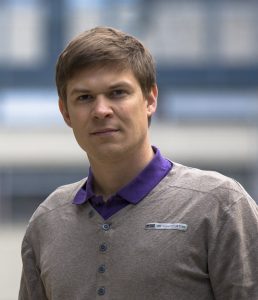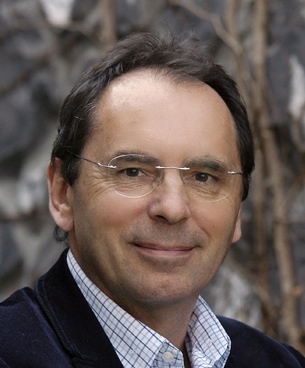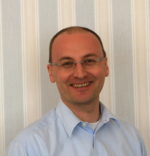KEYNOTE SPEAKERS
Georges Kaddoum
Institute of Computer Graphics and Vision
Graz University of Technology, Austria

Title: Learning better models for inverse problem in imaging
Abstract: In this talk, I will present our ongoing activities in learning better models for inverse problems in imaging. We consider classical variational models used for inverse problems but generalized these models by introducing a large number of free model parameters. We learn the free model parameters by minimizing a loss function comparing the reconstructed images obtained from the variational models with ground truth solutions from a training data base. I will also show recent results on learning “deeper” regularizers that are allowed to change their parameters in each iteration of the algorithm. We show applications to different inverse problems in imaging where we put a particular focus on image reconstruction from undersampled MRI data.
CV: Georges Kaddoum received the Bachelor’s degree in electrical engineering from the \’Ecole Nationale Supérieure de Techniques Avancées (ENSTA Bretagne), Brest, France, and the M.S. degree in telecommunications and signal processing(circuits, systems, and signal processing) from the Universit\’e de Bretagne Occidentale and Telecom Bretagne (ENSTB), Brest, in 2005 and the Ph.D. degree (with honors) in signal processing and telecommunications from the National Institute of Applied Sciences (INSA), University of Toulouse, Toulouse, France, in 2009. He is currently an Associate Professor and Tier 2 Canada Research Chair with the \’Ecole de Technologie Sup\’erieure (\’ETS), Universit\’e du Qu\’ebec, Montr\’eal, Canada. In 2014, he was awarded the \’ETS Research Chair in physical-layer security for wireless networks. Since 2010, he has been a Scientific Consultant in the field of space and wireless telecommunications for several US and Canadian companies. He has published over 200+ journal and conference papers and has two pending patents. His recent research activities cover mobile communication systems, modulations, security, and space communications and navigation. Dr. Kaddoum received the Best Papers Awards at the 2014 IEEE International Conference on Wireless and Mobile Computing, Networking, Communications (WIMOB), with three coauthors, and at the 2017 IEEE International Symposium on Personal Indoor and Mobile Radio Communications (PIMRC), with four coauthors. Moreover, he received IEEE Transactions on Communications Exemplary Reviewer Award for the year 2015, 2017, 2019. In addition, he received the research excellence award of the Universit\’e du Qu\’ebec in the year 2018. In the year 2019, he received the research excellence award from the \’ETS in recognition of his outstanding research outcomes. Prof. Kaddoum is currently serving as an Associate Editor for IEEE Transactions on Information Forensics and Security, and IEEE Communications Letters.
Davor Pavuna
Davor PAVUNA
Institute of Physics – LPCM
Ecole Polytechnique Federale de Lausanne (EPFL)
CH-1015 Lausanne EPFL, Switzerland
davor.pavuna@epfl.ch

Title: On Quantum Computing, Kurzweil Singularity and Beyond
Abstract: Successes of the twentieth century physics and electronics made a huge impact on our society: from space technology to improved medical tools to colossal advancements in computing … And, while we still do not understand complex cooperative phenomena in the nanoscale limit, we nevertheless have ever more advanced software and over 6 billion smartphones! Moreover, in this early 3rd Millenium, we face huge challenges: Many timely, relevant themes are discussed here at the 2018. International Conference on Smart Systems and Technologies, yet I will deliberately discuss somewhat broader vision. Fast advancements in Quantum Computing (QC) and Artificial Intelligence (AI), beyond the Kurzweil singularity, are very competitive fields, and we will consider some latest examples and emerging trends. And I am happy to admit that we cannot as yet provide all coherent answers in QC or AI, so there are great opportunities for our new generations!
CV: Elementary school in Osijek, B.Sc. and M.Sc. in Zagreb (PMF, 1977); Ph.D. on electronic properties of amorphous metals (1982) under Sydney Dugdale, the President of the Science Research Council of Great Britain. After 3 years in CNRS (Grenoble), in 1986. joins the Swiss Federal Institute of Technology at Lausanne (EPFL). Successful research on (macroscopic) quantum phenomena within disorder in quantum matter. Publications include >200 cc papers, 35 topical reviews, 25 edited professional books, and a textbook on superconductivity (1992), used in >4000 courses worldwide! Co-organizer of 28 international conferences (see http://dubrovnik.epfl.ch ) and 7 summer schools. More than hundred colloquia in leading institutions worldwide and as many invited conference talks; hundreds of public lectures. Adviser to 36 government agencies and advanced high-tech companies worldwide. Tesla World Foundation President.
Dr. Edgar Weippl
Research Director of SBA Research and Privatdozent at the TU Wien

Title: Research Methods and Examples of Research in Distributed Systems Security
Abstract: Over the past few years an increasing number of descriptive works have helped explain complex phenomena in the area of distributed systems security. These include the efficiency of spam campaigns, the distribution of bots, or the likelihood of users to accept false identities as friends in social networks. Studies in this field are characterized by the necessity of empirical research based on observing, describing and inferring the behaviour of complex systems.
Future research in the area of distributed systems security, including my own work, will use empirical research to complement design science as research method. Specifically, this approach consists of 1) passively observing large systems; (2) active probing that stimulates revealing behaviour of the systems; (3) developing solutions for relevant security problems; (4) and evaluating these contributions. Its impact on a large number of users makes this area of research relevant and urgent. By following the described methodology, it will be possible to improve security in an existing ecosystem in which changes can be deployed only over a long period of time.
CV: Edgar R. Weippl is Research Director of SBA Research and associate professor (Privatdozent) at the Vienna University of Technology and teaches at several universities of applied sciences (Fachhochschulen). His research focuses on applied concepts of IT-security; he is on the editorial board of Elsevier’s Computers & Security journal (COSE), PC chair of ESORICS 2015, general chair of ACM CCS 2016 and PC Chair of SACMAT 2017.
After graduating with a Ph.D. from the Vienna University of Technology, Edgar worked for two years in a research startup. He spent one year teaching as an assistant professor at Beloit College, WI. From 2002 to 2004, while with the software vendor ISIS Papyrus, he worked as a consultant for an HMO in New York, NY and Albany, NY, and for the financial industry in Frankfurt, Germany. In 2004 he joined the Vienna University of Technology and together with A Min Tjoa and Markus Klemen founded the research center SBA Research.
at the CSC 2018 (Cyber Security Conference 2018), co-located to SST 2018
